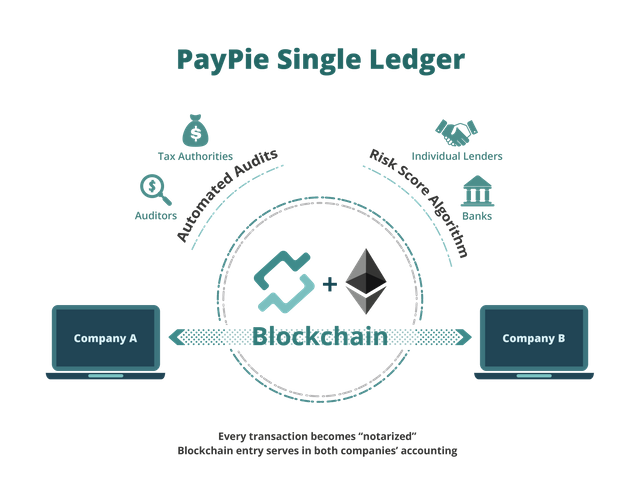Putting the Trust back to Business Accounting - Paypie
Enron, WorldCom, Freddie Mac, American Insurance Group, Lehman Brothers. What does all these companies have in common? They have all committed accounting fraud once a upon a time. Enron $628millions in 2000, WorldCom $11 billion in 2002, Freddie Mac $5 billion in 2003, AIG $3.9 billions in 2005, Lehman Brothers $50 billion in 2008. All these numbers were hidden in their accounting ledger because their ledgers were closed systems and lend themselves easily to accounting fraud and misrepresentations. Amongst the millions of line items within their ledger, it is not rocket science to be hide transactions or create false vehicles to keep their debts off their balance sheets. All these will not be possible if all their accounting entries are also “balanced” with the ledgers of companies / entities that they are doing business with. Enter PayPie.

A triple entry accounting system that lives on the Blockchain. By recording every business transactions and accounting entries into a blockchain, we will have better visibility of each business’s financial health and understand the financial health of the business. Each income and expense can be correlated with a corresponding expense or income of another business entity and hence the entire ecosystem of business on Paypie will be balanced, so to speak. We can then trust the accounting ledger of each and every business that journals its transactions on the Paypie blockchain.
The entries onto the blockchain will not be an additional step by the accounting staff of respective companies. These will be built into the backend of accounting software such as SlickPie, Xero, QBO, Sage, SAP, Netsuite etc. Currently SlickPie already has the initial accounting logic framework and source code for the foundation of Paypie platform and this will allow Paypie to quickly jumpstart this triple entry accounting system. Any existing accounting system can integrate with the Paypie API and allow their entries to be recorded onto the Paypie blockchain and then be balanced with corresponding entities’ balance sheets.
So what will this improved transparency do for companies? What do they gain from integrating with Paypie? Should they even open their financial health for scrutiny by the world in real time? What will this level of transparency bring them? For one, their auditing processes will be dramatically faster as all transactions would have already been verified on the Paypie blockchain. Next their financial health and their credit score would be available to lenders, thereby making it possible for leaders to readily decide on the best loans for them. This is especially advantageous for SMEs who have historically been unable to secure business loans as most banks are uncertain of the reliability of their balance sheets. With a verifiable ledger, securing loans, investments or invoice factoring would no longer be an obstacle for financially healthy companies. As for investors and banks, we can now be confident when we read the balance sheets of companies with their financial health on Paypie.
This will be a public ledger that offers trust in real time and I expect accounting platforms to jump on board to build that additional reliability for the users’ ledger system. At the same time, lenders and investors such as banks, hedge funds, venture capitalists, P2P lenders and even private investors will want access to the Paypie blockchain, to add the additional edge to their decision process for loans and investments today. The future is certainly bright for Paypie.
Relevant Links:
bitcointalk: https://bitcointalk.org/index.php?action=profile;u=1118743